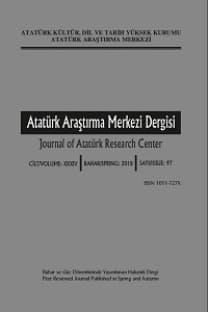Ulusal Egemenlik ve Atatürk
Her yıl 23 Nisan günü, 23 Nisan 1920’de Ankara'da toplanan TBMM'nin kuruluşunun yıldönümü olarak kutlanmaktadır. Bu nedenle Atatürk ile Millî Egemenlik arasındaki ilgi güncel bir konudur. Bilindiği gibi, geniş bir tanım İle Atatürkçülük, Türk miletinin tam bağımsızlığa, huzur ve refaha sahip olması, devletin millet egemenliği esasına dayandırılması, aklın ve iklin rehberliğinde çağdaş uygarlık düzeyine çıkarılması, amacı ile esasları Atatürk tarafından belirtilen fikir ve ilkelerin bütünüdür.
Anahtar Kelimeler:
Ulusal Egemenlik, Atatürk, Türkiye
Muslims of British India and The Kemalist Reform in Turkey Iqbal, Jinnah and Atatürk, 1924-1938
Ever since his emergence as the leader of the Turkish nationalists, Kemal Atatürk had attracted wide support from among the Müslim of British India. Though the adulation of Kemal had sprung from the Indian in- volvement with pan-Islam but basically it was his apparent defence of the caliphate which had endeared him to his well-wishers in the Subcontinent. Thus, ali through the exuberance of the Khilafat movement (1918-1924), Mustafa Kemal was lauded for his perceived stand against Western im- perialism in the hour of Islam's grave crisis. Even when the relations between the sultan-caliph at İstanbul and the nationalists at Ankara fell to their lowest ebb, as in Nowember 1922 owing to the separation of the sultanate and the caliphate, no widespread stir w as created in India. The clash came only in March 1924, when Kemal abolished the caliphate which to him had become anomalous and anachronistic. The reaction in India was instantaneous and sharp, but somehow the break was soon repaired. After the initial shock, the Indian public opinion, spearheaded by those who understood the Turkish predicament, began to tilt again in favour of the nationalists and the new situation generally came to be accepted.
Keywords:
British India, United Kingdom Muslims, Atatürk, Turkey,
___
- Giritli, İsmet, Ulusal Egemenlik ve Atatürk, Atatürk Araştırma Merkezi Dergisi, C XII, S 34, Mart 1996.
- ISSN: 1011-727X
- Yayın Aralığı: Yılda 2 Sayı
- Başlangıç: 1984
- Yayıncı: Atatürk Kültür, Dil ve Tarih Yüksek Kurumu Atatürk Araştırma Merkezi
Sayıdaki Diğer Makaleler
Atatürk’ün Hatay Politikası 1 (1936 -1938)
Milli Mücadele'de Sivas'ın Yeri ve Önemi
Atatürk Devri İzmir Basını ve Kamuoyu Üzerindeki Tesiri
Türkiye’de Cumhurbaşkanlığı ile Siyasi Parti Üyeliğinin Birbirinden Ayrılması Süreci (1923-1961)
Yakın Tarihimizde Kastamonulu Kadınlar
